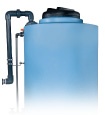Barium is a chemical found at relatively low levels in nature, but if it seeps into the drinking water, it can cause a variety of potential health problems. Due to these significant health risks, the Environmental Protection Agency (EPA) has ordered all water treatment plants in areas with higher levels of barium to remove its contents from the water prior to releasing it to the public for consumption.
Topics:
Applications,
Tank Design and Materials
The food and beverage industry has a long history of relying on stainless steel storage tanks due to the belief that the resins in a polyethylene storage tank allow leaching and bacterial growth with food dyes and other food products.
Topics:
Chemicals,
Applications
Safe water storage is important for both residential and commercial uses. In residential applications, homeowners capture rainwater for watering lawns and gardens. Water storage is necessary in a wide variety of commercial processes, including farming irrigation, livestock care, and cleaning.
Topics:
Applications
There are several types of chlorine sources that water treatment plants can use: chlorine gas, liquid sodium hypochlorite, or onsite production. Chlorine gas can be more cost effective, but a growing number of states are converting to bulk sodium hypochlorite or bleach. If chlorine gas is more economical, why would water treatment plants convert to sodium hypochlorite?
Topics:
Applications,
Chemical Storage
Stainless steel has long been the tank material of choice for storage in the food and beverage industry. Businesses have been hesitant to use polyethylene storage solutions, believing the porous resins would allow leaching and bacterial growth. Poly Processing’s innovative OR-1000™ system gives you an alternative option to expensive steel tanks. Our advanced polyethylene resin technology is fully FDA/CFR compliant, giving you a storage solution with longevity and cost savings advantages for food and beverage operations.
Topics:
Applications
In 2014, the water storage systems market in North America was valued at $2.45 billion, and it’s projected to top $4 Billion by 2020. As freshwater resources are becoming more scarce in growing population centers, and concerns over water conservation are increasing, potable water storage is becoming a big deal. Municipalities, commercial industries, and even residential markets need to make the most of their potable water storage systems.
Topics:
Applications,
News and Customer Stories
Three of the most challenging industries for storing chemicals are also areas we’ve serviced for over 30 years. The plating, mining, and high-tech industries each use aggressive chemicals, and they require chemical storage solutions that can handle highly corrosive compounds. Top companies in the mining, plating, and high-tech industries trust Poly Processing’s innovative technologies to safely contain highly corrosive chemical solutions. Our OR-1000™ and IMFO® tank components are unparalleled when it comes to durability and reliability. Here’s why these industries use our chemical storage solutions:
Topics:
Applications
Industries that use chemicals and solutions with special chemical standards have to keep a close watch on the storage solutions they rely on. Chemical storage tanks that are susceptible to corrosion or bacterial growth are costly to maintain and replace, and great care must be taken to ensure that the stored materials are preserved.
Topics:
Applications
The pharmaceutical industry has a history of using stainless steel storage tanks due to the belief that the resins in a polyethylene storage tank would allow leaching and bacterial growth with pharmaceutical products. But stainless steel tanks have drawbacks. Because they can contain chemical attack points, the tanks require expensive coatings and ongoing maintenance and inspection. Seams and welding spots are especially prone to compromise.
Topics:
Applications
Hydraulic fracturing, also known as fracking or fracing, is the process of making small cracks or fractures in underground rocks to release the oil or natural gas inside. Scientists must analyze the physical characteristics of the rocks to be fractured before fracking can begin.
Topics:
Applications



